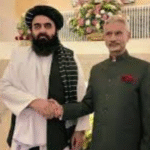A major controversy has broken out after women journalists were reportedly stopped from attending a press conference by Afghanistan’s Taliban government at their embassy in Delhi. The government later clarified that it had nothing to do with organizing the event.
What happened
On Friday, Afghanistan’s Foreign Minister Amir Khan Muttaqi held a press conference at the Afghan Embassy in New Delhi. The problem? No women journalists were present, and several female reporters claim they were prevented from entering – even though they had followed the required dress code.
The incident has sparked anger, with journalists taking to social media to express their outrage. Many pointed out that this happened on Indian soil, in the heart of the nation’s capital.
India’s response
The Ministry of External Affairs (MEA) was quick to remind those outraging on the issues that the government had nothing to with what happens at the Afghan embassy. The government made its position clear: “We had no role to play in this press conference.”
According to the MEA, the invitations for the event were sent out by Afghanistan’s Consul General in Mumbai, not by Indian authorities. The ministry also emphasized an important point – the Afghan Embassy premises do not fall under Indian government jurisdiction. In other words, what happens inside the embassy is technically falls under the Afghan territory.
The government’s message was simple: this was an Afghan event, organized by Afghan officials, on Afghan diplomatic property.
Why this matters
The Taliban government has been notorious for its treatment of women. Since returning to power in Afghanistan, they have imposed severe restrictions on women’s rights. Women have been banned from most workplaces, girls’ education has been severely limited, and now even books written by women authors have been banned from Afghan universities.
The Taliban recently dropped 18 courses from universities, including subjects like Gender and Development, Women’s Sociology, and Human Rights. This makes the exclusion of women from a press conference seem like an extension of their policies – but this time, it happened in India.
Political backlash
Congress leader Rahul Gandhi targeted Prime Minister Narendra Modi directly, saying, “When you allow the exclusion of women journalists from a public forum, you are telling every woman in India that you are too weak to stand up for them.” He accused the PM of staying silent despite his slogans about women’s empowerment.
Former Union Minister P Chidambaram took a different angle, saying the male journalists who attended should have walked out in protest when they realized their female colleagues were excluded.
The bigger picture
Muttaqi’s visit to India was actually quite significant. He arrived on Thursday and met with External Affairs Minister S Jaishankar on Friday. During that meeting, India announced it would upgrade its technical mission in Kabul to a full embassy – a major diplomatic step.
Jaishankar spoke about India’s commitment to Afghanistan’s development and announced six new development projects. The meeting was seen as an important reset in India-Afghanistan relations after years of uncertainty following the Taliban takeover.
But now, instead of celebrating improved diplomatic ties, India finds itself defending its position on why women were excluded from a press event held in its own capital city – even if technically on foreign soil.









